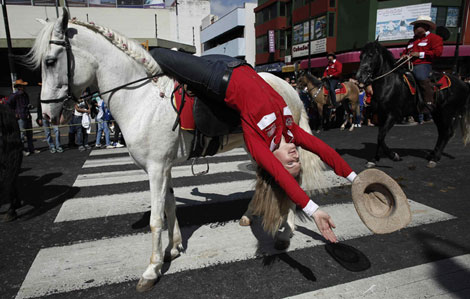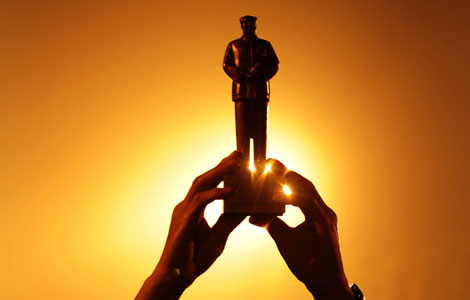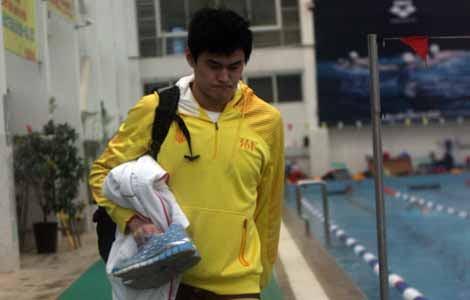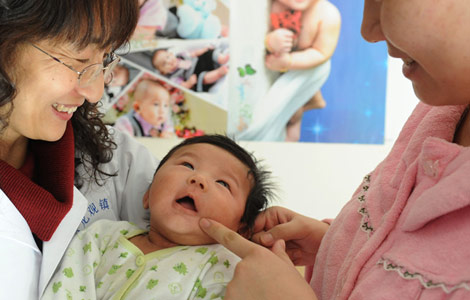Shock 'tigers' and awe 'flies'
Updated: 2013-12-27 06:49
By Wu Yixue (China Daily USA)
|
||||||||
Five-year anti-graft plan shows leaders' determination to curb corruption by building up institutionalized cages for power
The five-year anti-corruption plan issued by the Communist Party of China Central Committee on Wednesday is testament to the top Chinese leadership's unshakable determination to fight corruption and a substantial step toward fulfilling its vow to put power within an institutionalized cage.
The 6,000-character guideline document, a reflection of the Party's top-level anti-graft design, includes not just general anti-corruption goals but also concrete measures and ways toward this end, including punishing any official involved, however high his or her position is. It is an incarnation of the Chinese new leadership's well-conceived thinking in its uphill battle against corruption.
The document has raised people's hopes that corruption will be effectively contained and eventually eradicated because it sets an explicit goal: "After five years of relentless efforts, the spreading tendency of corruption will be resolutely curbed, and progresses and effects generally satisfactory to the public will be achieved."
The leadership never underestimates the scale of the task. "Corruption is still widespread, the soil that nourishes corruption still exists, and the situation remains critical and complicated," the document says.
Such a clear acknowledgement of the problem is itself a reflection of the new leadership's pragmatic working style and courage.
The document reinforces the resolve of the leadership to imprison unbridled power in a cage of regulations and crack down on both high-ranking "tigers" and low-ranking "flies", and contains a vow that probes will be made of anyone who dares to cross the bottom line of State laws and Party disciplines, no matter who is involved and no matter how senior they are. Such wording is by no means hollow saber-rattling that lacks substance. The downfall of a series of senior officials over the past year, especially the investigation into several ministerial-level officials since the Third Plenum of the 18th CPC Central Committee, serves as the best evidence that this pledge is serious.
However, preventative mechanisms are at the heart of the plan. The document outlines a far-ranging network of methods and measures aimed at limiting the space for corruption, embodying a shift in approach from mainly focusing on punishing corrupt officials to focusing on building a comprehensive anti-corruption framework. Putting in place a full-fledged anti-corruption system will reduce the opportunities for officials to be tempted and deter officials from giving in to the temptation when they are. To this end, the document stresses, an extensive supervisory mechanism, including Internet and intra-Party supervision, will be set up and strengthened.
The document also calls for an improved legal system - and measures to ensure judicial independence - to ensure the effective implementation of various anti-decadence regulations, including those concerning the use of public vehicles, the construction of office compounds, business receptions and overseas trips. Putting this into effect will improve the image of both the government and Party and increase judicial openness.
At the same time, the Party itself has been promoting inner-Party regulations against corruption, and the document sets forth the demand that officials at ministerial and provincial levels will have to submit an annual clean-governance report to the central authorities, a requirement that marks a bigger step toward preventing corruption among the country's senior officials. Unrestrained power usually leads to abuse of power and corruption. A clean-governance reporting system and tightened accountability for malpractices will thus serve as an effective way of imposing more restraints and supervision on the power of major leading officials.
Another initiative mentioned in the document is setting up a sound system for senior officials to report their personal affairs and properties, including measures to make public necessary information of newly nominated leaders' families. The initiative, raised by the Party's top anti-graft watchdog and expected to be exercised on a trial basis first, will be putting officials' public-related affairs under sunlight. State-owned enterprises and financial organizations will also be placed under inquisition and responsibility systems.
The establishment of an open and transparent property information disclosure system is widely believed to be an effective way to prevent and deter corruption, and greater transparency should also be exercised in Party, government and judicial affairs, especially government budgets, large projects and public undertakings.
Administrative supervision will include the overseeing of senior-level departments and auditing procedures, and officials should be put under the watchful eyes of the Chinese People's Political Consultative Conference, various political parties other than the CPC, business federations and trade unions. Moreover, the guideline also encourages public supervision, especially through the Internet.
Corruption is a widely reviled social sin. The newly published five-year plan undoubtedly marks the ruling Party's new and upgraded efforts to cure and eradicate this long intractable issue. Inspiringly, the leadership has dealt a heavy blow against corrupt officials over the past year, and taken substantial steps toward restraining power through legislation and building systems and strengthening Party and public supervision.
The author is a senior writer with China Daily.
wuyixue@chinadaily.com.cn
(China Daily USA 12/27/2013 page15)

 LeBron James is AP's Male Athlete of the Year
LeBron James is AP's Male Athlete of the Year
 Year-end horse-ride parade California
Year-end horse-ride parade California
 Pick your new year sunrise
Pick your new year sunrise
 Memorial a big draw on Mao's birthday
Memorial a big draw on Mao's birthday
 China's urbanization rate to hit 60% by 2018
China's urbanization rate to hit 60% by 2018
 Oly champion resumes training after scandal
Oly champion resumes training after scandal
 Private clinics take on new role
Private clinics take on new role
 Obama thanks troops for service
Obama thanks troops for service
Most Viewed
Editor's Picks

|

|

|

|

|

|
Today's Top News
2013 sees loss of US credibility
Huge potential seen for preschool English in China
Chinese university leaders round-up ideas in Texas
Anger over Abe's World War II shrine visit
US sends missiles, drones to Iraq
US airbase relocation approved
Accounting fraud chills US investors
'An overall view' on Mao required
US Weekly

|

|






